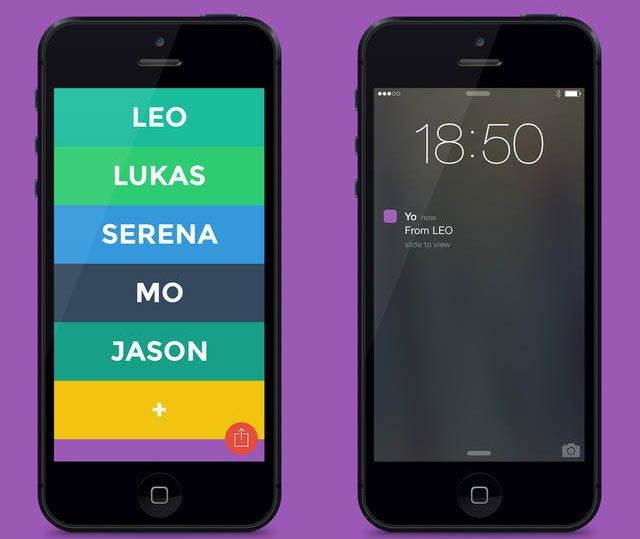Rhodri Marsden: This new app Yo is a funny idea but $1.2m of funding is no joke

The internet has made us an excitable bunch. We jump on speeding bandwagons, keen to be in on something early and eager to get people to join us. Our behaviour can be measured down to the last unit, our rapidly changing interests charted across the web on hit-counters and graphs, soaring as we embrace something, and then levelling off or plummeting as we get bored. Last week, that almost violent capriciousness was demonstrated perfectly by a little app called Yo.
No more than a day's work for the person who coded it, Yo allows you to make a friend's phone emit the sound "Yo!" by tapping on their name on your phone's screen. Whether it was down to its simplicity, its inherent stupidity or the fact that news was sluggish in the world of technology, interest in Yo quickly reached fever pitch – particularly when it became known that investors had pledged $1.2m (£707,000) towards its development. When silly money is dumped on a silly idea, the silliness escalates. "Is this really all it does?" I giggled to myself, repeatedly sending multiple "Yos" to friends who responded with "Yos" of their own. As one Yo investor put it: "It's crazy, it's viral, the engagement is unbelievable."
But only for so long. Yo's appeal is laughably ephemeral; it's a mayfly amongst apps. It might still be riding high in the download charts, but after you've had it for 24 hours sending a "Yo" feels like a retro activity akin to wearing deely-boppers.
When Yo was first submitted to the App Store, Apple rejected it for "lacking substance", and while one can intellectualise about its purpose (indeed, Yo's chief executive Or Arbel has been doing just that, referring to Yo as "context-based messaging", where a "Yo" can have different meanings depending on who the sender and recipient are) it's essentially a one-joke pony. After receiving a poorly timed "Yo" in the middle of the night, I turned off the app's notifications, which was like unplugging its life-support system. It now sits on my phone, a redundant purple square, serving no purpose.
Which isn't to say that the "zero-character communication" represented by Yo isn't useful. We nudge, wink and nod at each other every day, knowing (or hoping) that the other person understands what we're getting at. We've done it using landlines ("call me when you get in and let it ring three times so I know you're ok"), we've toyed briefly with other online manifestations (eg, "poking" friends on Facebook), and do it daily via text message, sending kisses, emoticons or emojis to say nothing more than "I am thinking about you".
But our fleeting interest in Yo had little to do with this, and everything to do with the fact that a phone going "Yo" is funny. But only very briefly.
Yo's brush with fame would only be as notable as your bog-standard viral video of an inquisitive dog, were it not for the amount of money being thrown at it – and there continues to be widespread disbelief on that score. It would be a piece of cake to build Yo's functionality into existing messaging apps or even a smartphone's operating system, neutering Yo at a stroke.
Yes, there's evidently a need for the digital equivalent of the nudge and the wink – the buzz of reassurance, the beep of acknowledgement – but whether there's a market for that is another question entirely.
Subscribe to Independent Premium to bookmark this article
Want to bookmark your favourite articles and stories to read or reference later? Start your Independent Premium subscription today.

Join our commenting forum
Join thought-provoking conversations, follow other Independent readers and see their replies